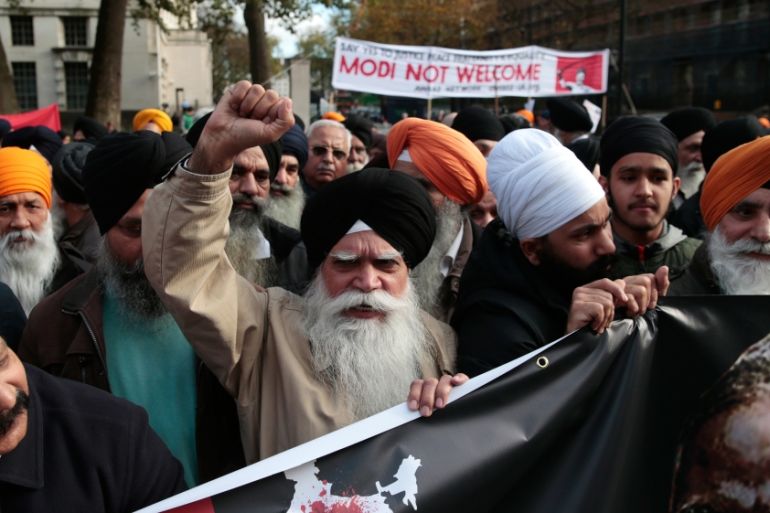Why are Indian officials banned from Sikh Gurdwaras?
Canada, US, and UK groups take action after arrest of British Sikh in Punjab and amid ‘interference’ in their affairs.

Sikh religious organisations in Canada, the US, and the UK have banned Indian officials from making formal visits to temples in response to the arrest of a Sikh activist in India and what they call interference in their affairs.
The ban started in Canada and spread to temples in the US and the UK, with more than 100 places of worship now involved.
Keep reading
list of 4 itemsMuslim pupil loses UK court bid over Michaela school prayer rituals ban
Photos: Sikhs celebrate harvest festival of Baisakhi, marking new year
Masses gather for Eid celebrations in India
Davinder Singh of the Sikh Federation UK, one of the organisations supporting the campaign, said that the ban would apply to official visits but not personal trips to temples.
The November arrest of British Sikh activist Jagtar Singh Johal by Indian authorities and “interference in Sikh affairs” by Indian officials had led to the move, he told Al Jazeera.
Johal was detained in the northern state of Punjab and accused of involvement in the killings of prominent Hindu figures.
His family has rejected the allegations against him, explaining that he was in India to get married.
Sikh activists say his arrest was politically motivated.
![Indian police arrested Jagtar Singh Johal in November [Courtesy of the Johal family]](/wp-content/uploads/2017/11/98f6a50fe5d3488294c5a389a10e6a5e_18.jpeg)
“People are really upset,” said Davinder Singh. “If someone goes to India to get married, the last thing they expect is to be picked up and abducted, not to be charged, to be subject to third-degree torture.
“I think it’s cases like this that got a reaction from the Sikh community.”
1984 massacre
While Johal’s arrest triggered the latest dispute between the Indian government and some members of the Sikh diaspora, tensions between the two sides date back decades.
In the summer of 1984, Indian troops battling Sikh fighters stormed Sikhism’s holiest Gurdwara, the Golden Temple, leaving hundreds dead.
Later that year, Indian Prime Minister Indira Gandhi was shot dead by her Sikh bodyguards, who held her responsible for the bloodshed.
In the aftermath of Gandhi’s death, thousands of Sikhs were killed as sectarian mobs targeted Sikhs in Punjab, and the Indian capital New Delhi.
Sikhs have described the killings as a genocide.
Anger persists, particularly among the Sikh diaspora, for the Indian government’s refusal to apologise.
“Much of this unease goes back to the events of June and November 1984,” said Jasjit Singh, a research fellow focused on British South Asians at the University of Leeds.
“Before this time, many Sikhs in the diaspora generally supported the Indian government, regularly raising funds for India,” he told Al Jazeera.
|
|
“The events of Operation Bluestar (Storming of the Golden Temple) in June 1984 and the anti-Sikh violence of November 1984 remain unresolved issues for many Sikhs in the diaspora particularly those whose families were directly affected by these events.”
Sikh activists see that Indian politicians are taking advantage of Gurdwaras for political gain while refusing to acknowledge the legacy of 1984 and the anger over Johal’s arrest.
According to Davinder Singh, official visits to temples increased after Indian Prime Minister Narendra Modi came to power and were motivated by the politicisation of Gurdwaras, as opposed to the well-being of the Sikh community.
“Increasingly in the last couple of years they have targeted some of the larger Gurdwaras … when you start going to a religious institution, and a key one, you create friction in the community,” he said.
“People think here are the people who’ve carried out this genocide, they’ve never even apologised for it, now they’re arresting people … why are they going into our religious institutions?”
Gurdwaras are institutions where we discuss day-to-day issues that affect our lives ... We don't want to be preached at by Indian diplomats about what we do or don't do in our institutions
These purported attempts to shore up support among diaspora Sikhs come amid efforts to split Sikhs from their own causes, Davinder Singh said.
In a recent debate with an Indian official, broadcast on the BBC, Davinder Singh’s Sikh Federation UK organisation was accused of politicising Gurdwaras by supporting the visiting restrictions.
“Gurdwaras are institutions where we discuss day-to-day issues that affect our lives, whether they be human rights issues or about our identity,” he said. “We don’t want to be preached at by Indian diplomats about what we do or don’t do in our institutions.”
Sikhs make up a fraction of the Indian diaspora with around 500,000 in Canada, the US, and the UK respectively.
Nonetheless, their support carries importance for India’s political class.
“I think this is more of a symbolic move,” said Professor Gurharpal Singh of the School of Oriental and African Studies University of London, further describing the “tetchy” relationship between some members of the Sikh diaspora and the Indian government.
“Overall I don’t think the engagement of government officials overseas with Sikh places of worship has been very intense and very overwhelming [but] the symbolism is important,” he told Al Jazeera.
“Modi, who is trying to build alliances with non-resident Indians overseas; in that respect, it is a big deal.”
Follow Shafik Mandhai on Twitter: @ShafikFM